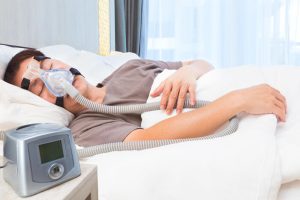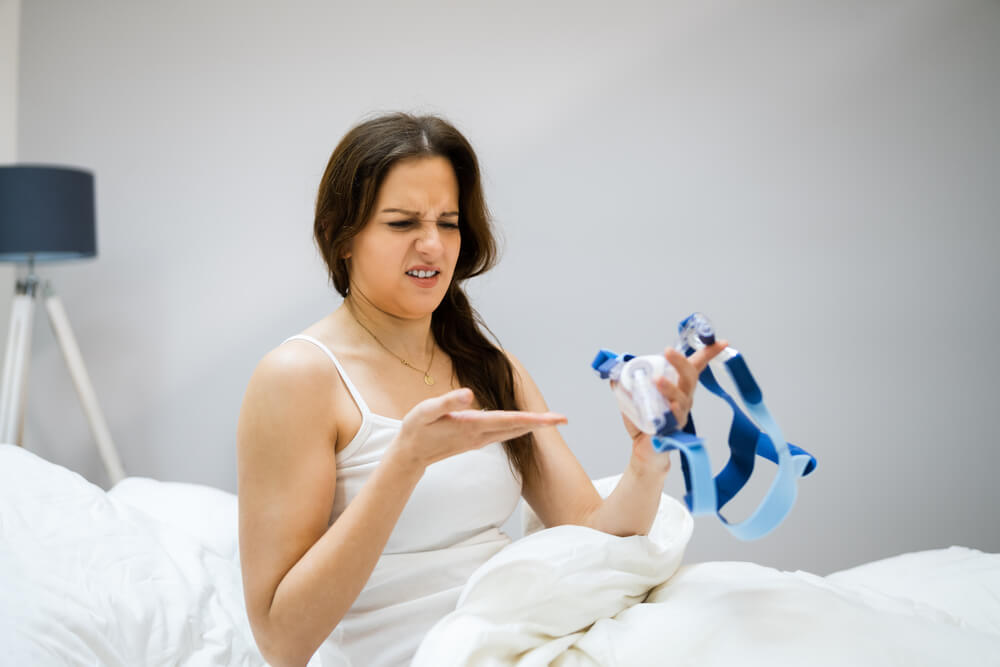Learn How Defective and Malfunctioning CPAP Machines May Lead to Health Issues Ranging from Asthma to Cancer

Getting a good night’s sleep is critical for optimal health. Prolonged sleep deprivation can lead to severe illnesses, including heart attack, stroke, memory loss, and psychiatric disorders, to name a few consequences of too little sleep over a long period. Those with sleep problems like obstructive sleep apnea may use a continuous positive airway pressure (CPAP) machine to help them sleep through the night and avoid poor-quality sleep. The device can be a lifesaver to some, but it can be life-threatening when it malfunctions. In some cases, injuries caused by defective CPAP machines can provide grounds for a lawsuit.
Our attorneys at Cohen & Riechelson have over 50 years of experience advocating for injury victims in Princeton, Hamilton, Burlington, Ewing, Mercer County and across New Jersey. We fight for injured victims who suffer complications and toxic exposure due to CPAP devices throughout New Jersey and Pennsylvania. If you have been hurt by a defective or recalled CPAP machine, call us at 609-528-2596 for a free review of your case.
How Does a CPAP Machine Work?
The device works by taking in surrounding air, filtering it, and then pumping in pressurized air into tubes that attach to a mask the user wears to sleep. The mask may cover the nose or nose and mouth. A CPAP device treats sleep apnea, a disorder of the airways. A person with this condition experiences intermittent oxygen deprivation when their relaxed throat muscles obstruct their airway. Snoring may be one sign of the disorder, but more often, the individual typically has unusually long moments of not breathing during sleep, followed by an audible air intake. Thus, the sleep apnea sufferer gets disrupted sleep and momentary oxygen deprivation, which can raise the risk of high blood pressure, heart attack, diabetes, stroke, and other conditions. The continuous air in the CPAP keeps the oxygen intake consistent and prevents breathing disruption.
Consequences of Malfunctioning or Defective CPAP Machines
When CPAP device malfunctions or has faulty materials, the wearer and those who sleep with the wearer can be in grave danger. One type of malfunction is in design. Philips Respironics, one manufacturer of the CPAP device, has found itself facing lawsuits about its machines containing materials that are dangerous to inhale when the synthetic material breaks down. In June of 2021, it had to recall millions of devices when they found the polyurethane mixture in the sound abatement foam to make the machine quieter breaks down with use, releasing particles into the tubes that draw air into the user. A person may see the black specks in the tubes or water used by the machine.
Medical Issues from Noise-Insulating Foam
The humidity from breathing and chemicals used to clean the device causes the noise-insulating foam to disintegrate over time and release particles into the user. Along with foam particles, the wearer inhales dangerous chemicals into their lungs, damaging them and the liver and kidney. Over time and exposure, a CPAP user can experience organ or heart failure. Inhaling harmful chemicals can also cause cancer or autoimmune diseases. And pregnant women who use defective CPAP machines may experience complications like placenta development defects, prematurity, and congenital disabilities in the fetus.
Health Impacts of Toxic Chemicals and Chemical Reaction Byproducts
Those within the breathing range of the CPAP user may also suffer health damage. Polyurethane foam disintegrates and releases particles and off-gases, meaning chemical reaction byproducts, including benzene, formaldehyde, methylene chloride, volatile organic compounds (VOCs), and other chemicals, which are known to cause various cancers when inhaled. Thus, many cancers trace to those exposed to toxic chemicals like urethane and polyurethane. Airborne chemicals pose potential harm to people close to the CPAP user.
Injuries and Conditions Related to Defective CPAP Machines
The inhaled foam particles and harmful chemicals cause inflammatory responses that result in chronic respiratory conditions, like asthma or chronic obstructive pulmonary disorder, known as COPD. Respiratory disorder symptoms include shortness of breath, wheezing, bronchial tube obstruction, and coughing. Severe lung damage can lead to respiratory failure when a sufferer needs a ventilator or other oxygen device to breathe. Other symptoms to look for are nausea, vomiting, coughing, headaches, dizziness, sinus infections, chest pressure, and respiratory infections. These symptoms may indicate the user developed an illness connected to CPAP use, especially when the CPAP has been in use for several years.
CPAP & Sleep Apnea Machine Lawsuits

When manufacturers produce products with design defects, they endanger the lives of consumers using defective products. As such, Philips has faced multiple product liability lawsuits when users developed illnesses, including various cancers. While some CPAP users must use the machine to protect their health, they did not receive notice that the materials in the Philips CPAP were defective and poisonous, even with proper use. Evidence of consumer illness from the product surfaced before the recall, but the manufacturer failed to warn of the potential health hazard. With such a notice, users could choose to stop using the machine to prevent worse illnesses than sleep apnea. Instead, Philips continued to sell the product without warning the buyer.
Assessing Responsibility for Flawed CPAP Machines
When a manufacturer’s defective product and failure to warn of the dangers of using its product injures someone, it may be liable to the consumer, who ends up with medical bills for diagnosis and treatment. By filing a claim for damages against the manufacturer, an injured consumer can recover medical expenses from hospitalizations, doctor appointments, surgeries, medications, and treatment therapies. These costs may be ongoing, even lifelong. In addition, an injured user may receive compensation for lost wages due to missing work from illness or doctor visits in the past and future. An injured party may also collect reimbursement for noneconomic damages, such as pain and suffering, and emotional distress that come with enduring severe health problems.
Seeking Compensation for CPAP-Related Injuries in New Jersey
Since many symptoms resulting from the defective CPAP device may mimic other conditions, a plaintiff in a product’s liability lawsuit may have difficulty proving the defective device caused cancer or chronic respiratory illness, for example. However, the experienced products liability attorneys on our team understand and are fully immersed in the steps of investigating and proving causation in challenging cases. Given the existing lawsuits and product recall involving Philips Respironics, and the potential for other defectively designed or manufactured CPAP machines on the market today, we know how to use the plaintiffs’ various symptoms to provide ample evidence of the connection between the faulty product and the resulting illnesses. Moreover, blood analysis may detect the chemicals in the bloodstream, and body scans show affected organs by chemical poisoning.
Our accomplished personal injury and products liability attorneys have extensive experience hiring the right experts to prove causation, including medical experts, to testify that certain chemical exposure off-gases cause symptoms the CPAP user or bystander experiences. Our lawyers investigate the entirety of the case to find everything that we can use to get the compensation our injured clients deserve. Experts, medical reports, and research studies help prove that the manufacturer’s defective product or failure to warn caused your health problems, and we know how to pinpoint everything that you’ll need to successfully recover compensation from those responsible for your CPAP-related injuries.
Speak to Our Trenton New Jersey CPAP Injury Lawyers if You Have been Injured by a Defective CPAP Machine
When your diagnosis is cancer or another illness associated with long-term use of a CPAP machine from Philips or another manufacturer, contact our skilled products liability lawyers at Cohen & Riechelson for help proving and claiming your damages in Trenton, Lawrence, West Windsor, Hopewell, Pennington, Hightstown, and throughout Mercer County and surrounding areas in New Jersey. Call 609-528-2596 to discuss your case today. We provide free consultations and one of our attorneys will be ready to answer any questions you may have.

